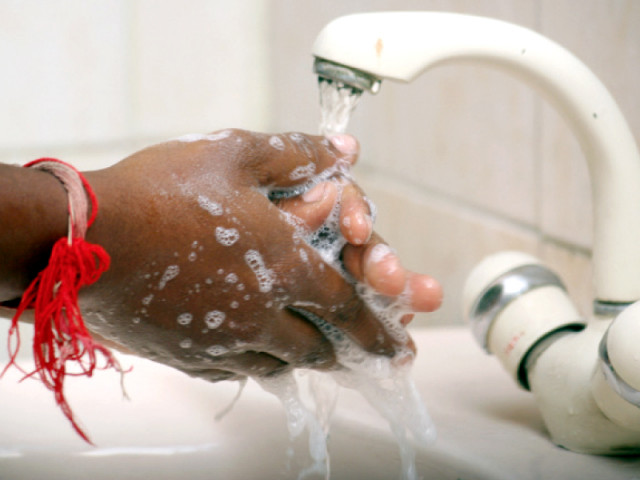Keep it clean: In Tharparkar, most students can’t answer nature’s call at school
the Global Handwashing Day is observed on October 15 and endorsed by more than 100 governments

As the world observed Global Handwashing Day on Wednesday, around 400 students enrolled at a government high school in Ibrahim Hyderi had no idea why it was important to wash their hands before meals or after using the toilet.
The school had two overflowing washrooms but the administration and teachers had no answer to why the children did not know about something as basic as washing their hands. Teachers kept insisting it was lack of funds. According to science teacher Shahid Baloch, they could not do anything till the government gave them the required amount of money.
While talking to The Express Tribune, a few students claimed that a non-governmental organisation had visited them and distributed soaps and towels among the children but the peons and chowkidars took them home instead.

"Three young women came to our school last year," said Rizwan Mallah, a ninth grader. "They gave us soaps, tissue papers and towels. When we came to school the next day everything was missing."
The students of this government high school are, however, not alone. Many schoolchildren in Sindh are not aware of the significance of washing their hands with soap and water.
Soap bubbles
Initiated in 2008, the Global Handwashing Day is observed on October 15 and endorsed by governments, international institutions, civil society organisations, NGOs and many private companies. Every year the day is observed by around 200 million people in more than 100 countries to raise awareness about the importance of washing hands to save lives and maintain hygiene.
According to social scientists, school children must act as agents of change to promote cleanliness. "Washing hands with soap is the most effective and cheap way to prevent diarrhoea, respiratory infections and other diseases which take lives of millions of children in developing countries," said Prof Dr Saifullah Jamro, the head of pediatric medicine at the Chandka Medical Hospital in Larkana. "By washing hands properly, we can also prevent skin and eye infections and intestinal worms."
Mukesh Raja, a social activist in Tharparkar, has been working on water and sanitation issues for the last five years. He has worked in several towns and villages in the districts and had surveyed the residents approach to washing their hands and sanitation facilities provided to them. The activist interviewed people in Mithi, Islamkot, Nangarparkar, Chachhro and Diplo - and learnt that around 88 per cent of households and 90 per cent of schools don't have access to toilets so more than 90 per cent of the population defecates in the open.

Clean hands, healthy children
Government records suggest that there are nearly 4,000 primary schools, 200 middle and higher secondary schools in the Tharparkar district. According to Raja, only 10 per cent of these schools have toilets - the schools which do have this facility are run or adopted by NGOs. He said that in their district, most of the students have to run to the buses to answer nature's call.
Towel dry
Pakistan is currently not on the track to meet its sanitation and hygiene 'Millenium Development Goal' target which is supposed to be completed by 2015.
It is estimated that every year approximately 60,000 children under the age of five could have been saved by reducing the chances of them catching pneumonia or diarrhoea - diseases which can be fought by washing hands.
"It's not just the children - the mothers, caregivers, older siblings, grandmothers and teachers also play an important role in influencing a child's habits," said Siddique Khan, the country director of WaterAid Pakistan, a UK based organistion working with water, sanitation and hygiene issues. "It is like a silent killer. The government and people don't take the issue seriously."
Published in The Express Tribune, October 16th, 2014.



















COMMENTS
Comments are moderated and generally will be posted if they are on-topic and not abusive.
For more information, please see our Comments FAQ